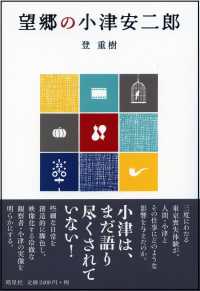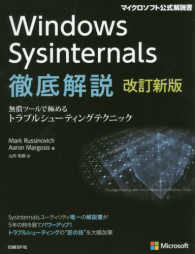Full Description
Theory and Methods for Public Pedagogy Research introduces promising new methods of public pedagogy research centered around transforming rather than explaining knowledge. The new methods are premised on a new theorisation of public pedagogy which recognises the educative agent. The agency of the public to speak, to be heard, to know is manifest as the educative agent speaks their knowledge and the researcher must be attentive to that speaking.
This work extends the well-established intellectual projects in the field to introduce four new methods for public pedagogy research: organisation, performance, curation and researcher. A key focus of this work is attending to how the circulation of knowledge in non-formal settings can be recognised. It examines the under-published area of pedagogy and research in public spaces and engages post-qualitative approaches to inquiry to open up the field. Moreover, it explores the possibility of performances, art exhibitions and museums as public spaces of knowledge generation and pedagogy. It also shows how research can be applied in practice in public pedagogy to discover best practices for working in these spaces. Finally, it confronts and critiques the dilemmas of public pedagogy research and the limits of research methods which have previously been deployed in this field.
This book will be of interest to researchers and students in the field of public education and teaching in a variety of social science and arts disciplines, and education.
Contents
Preface: Moving Beyond the Educational Institution and Traditional Methods
Introduction
Framework for our Reading
The Place of Method in Public Pedagogy Research
1. New Theorisation Of Public Pedagogy
1.1 Major Threads of Public Pedagogy Writing
1.2 The Public
1.3 Arendt and the Public Realm
1.4 Habermas and the Public Sphere
1.5 Multiple/Counter/Little/Migrating Publics
1.6 Speaking in the Public Realm
1.7 Authority
1.8 Re-constituting the Self
1.9 Pedagogy in the Field of Public Pedagogy
1.10 Pedagogy and the Pedagogical Encounter
1.11 The Structure of the Pedagogical Encounter
1.12 Public Pedagogy and the Educative Agent
1.13 Researching Public Pedagogy
1.14 Conclusion
2. Organisation as Research Method
2.1 The Institute
2.2 The Current Imperative—Institutional Educational Spaces
2.3 The Raphael Samuel History Centre
2.4 The PPI
2.5 Monthly Meetings
2.6 The Journal
2.7 The Conference
2.8 The Tango Touch
2.9 Political Pedagogy
2.10 How Does the Conference Teach Us about Public Pedagogy?
2.11 Critique of Organisation as Method
3. The Performance as Research Method
3.1 The Performance of the Pop Up School
3.2 The Knowledge Project and the Pop Up School
3.3 Footscray Pop Up School
3.4 Method in Arts-Based Research
3.5 Performance as Research Method
3.6 Performance Revealing the Public
3.7 The Pedagogical Encounter in the Public
3.8 Authority and the Educative Agent
3.9 Place in the Pedagogical Encounter
3.10 Knowledge in Public Pedagogy
3.11 Critique of Performance as Method
4. Public Curation as Research Method
4.1 Institutional Power
4.2 Architectural Power
4.3 Museums and Affect
4.4 The Changing Museum
4.5 Museums and Post-colonialism
4.6 Education and New Museum Forms
4.7 Educational Intervention
4.8 Disrupting Curatorial Power
4.9 Exhibiting the Public
4.10 Proximity of the Public and Migrating Publics
4.11 Critique of Curation as Method
5. Citizen Researcher as Research Method
5.1 Introduction
5.2 'Qualitative' Research and the Researcher
5.3 Researcher Position in Diverse Approaches
5.4 The Role of the Researcher in Public Pedagogy Research
5.5 The Researcher and the Other
5.6 The Public Migrates to the Researcher Space
5.7 The Portarlington Knowledge Project
5.8 Researchers as OOTS
5.9 The Professional Researchers in the Knowledge Project
5.10 The Citizen Researcher
5.11 Repositioning Public as Migrants
5.12 The Collapse of Educative Agents and Professional Pedagogue
5.13 Citizen Researchers—Migrating Publics and Proximity
5.14 Multiple Publics
5.15 Critique of Citizen Researcher as Method
6. Method and Theory
6.1 The Researcher and Power in Public Pedagogy Research
6.2 Experimental Methods
6.3 Bespoke Methods Addressing Complex Forces
6.4 Generative Methods
6.5 Theory conclusion
6.6 The Public
6.7 Educative Agent
6.8 Authority
6.9 Knowledge
6.10 The Public Pedagogical Encounter
6.11 Going Forward







